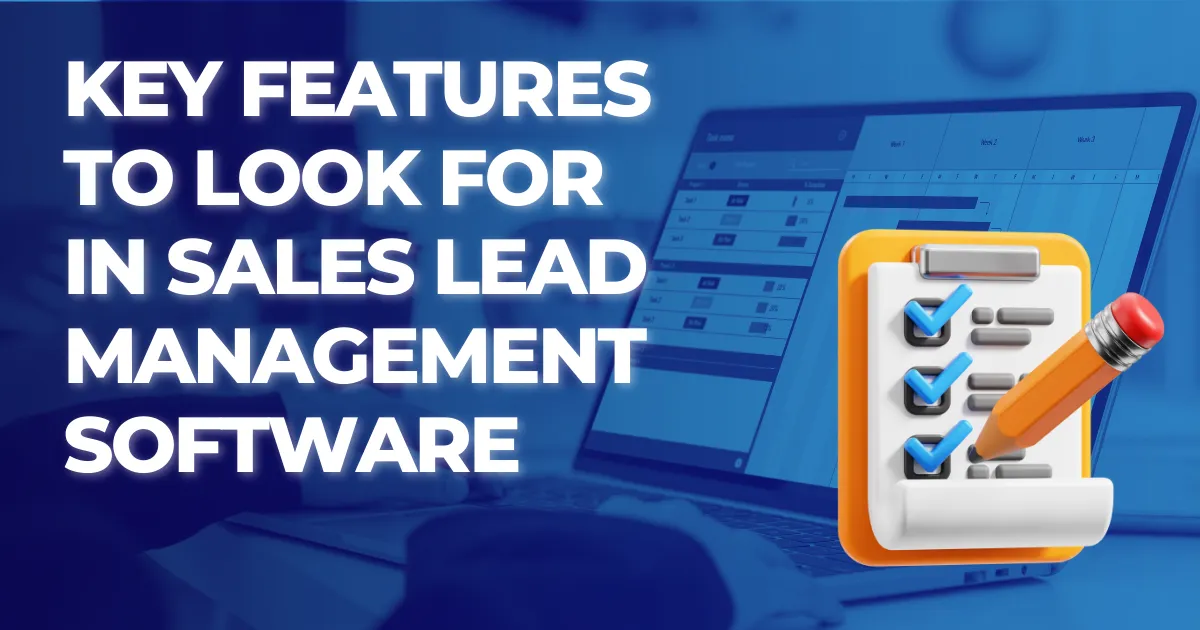In today’s fast-paced business world, managing leads effectively can mean the difference between skyrocketing sales and missed opportunities. The right sales lead management software can streamline your pipeline, automate follow-ups, and ensure no potential customer slips through the cracks. But with so many options available, how do you choose the best one for your business?
This guide will walk you through the critical factors to consider when selecting the perfect lead management app or lead management CRM software to optimize your sales process.
Why You Need Sales Lead Management Software
Businesses often struggle with scattered leads, ineffective follow-ups, and lost opportunities due to manual tracking. Sales lead management software solves these problems by:
- Centralizing lead data: Store all customer information in one place for easy access.
- Automating tasks: Reduce manual work with automated follow-ups and reminders.
- Improving conversions: Nurture leads effectively and close deals faster.
- Tracking performance: Analyze lead sources, sales efforts, and team performance.
Choosing the right tool can supercharge your sales team and enhance customer relationships.
🔗 Read More: Building Your Pipeline: Learn Lead Generation and Attract Your Ideal Clients
Key Features to Look for in Sales Lead Management Software
To make the best choice, look for these essential features in a lead management CRM software:
1. Lead Capture & Organization
A robust lead management app should automatically capture leads from various sources, such as websites, social media, and email campaigns. It should:
- Integrate with your CRM and marketing tools.
- Allow easy segmentation based on behavior and demographics.
- Provide tagging and filtering for better organization.
2. Automation & Workflow Management
Automation is a game-changer in lead management. The right sales lead management software should:
- Automate email follow-ups and reminders.
- Assign leads to the right sales reps based on predefined rules.
- Score leads based on engagement and likelihood to convert.
3. Integration with CRM & Other Tools
If you already use a CRM for leads, ensure the software integrates seamlessly. Look for compatibility with:
- Email marketing platforms like Mailchimp or HubSpot.
- Customer support software like Zendesk.
- Sales tools like Salesforce or Pipedrive.
This connectivity ensures a smooth transition and data flow across your business.
4. Analytics & Reporting Capabilities
A lead management CRM software should provide insightful reports, including:
- Lead source effectiveness.
- Sales funnel progression.
- Sales rep performance and response times.
With the right data, you can refine your strategy and make data-driven decisions.
5. User-Friendly Interface & Accessibility
A complicated tool will slow down your team instead of helping them. Ensure the software is:
- Easy to navigate and requires minimal training.
- Available as a lead management app for mobile access.
- Customizable to fit your business processes.
How to Evaluate Sales Lead Management Software for Your Business
Before making a final decision, follow these steps to evaluate different options:
1. Define Your Business Needs
Start by answering these questions:
- How many leads do you manage monthly?
- What is your average sales cycle length?
- Do you need a simple tool or an advanced CRM?
This helps you determine whether you need a lightweight lead management app or a more comprehensive lead management CRM software.
🔗 Read More: How to Choose the Right Lead Management Tools for Your Sales Team
2. Compare Software Options
Feature | Essential for Small Businesses | Must-Have for Enterprises |
Lead Capture | ✅ | ✅ |
Automation | ✅ | ✅ |
CRM Integration | ✅ | ✅ |
Mobile Access | ✅ | ✅ |
Advanced Analytics | ❌ | ✅ |
3. Test Before You Commit
Many software providers offer free trials. Utilize them to:
- Assess ease of use.
- Test integration with your current tools.
- Check how well automation features work.
4. Consider Pricing & Scalability
Not all businesses need the most expensive software. Compare:
- Monthly vs. annual pricing.
- Features included in different pricing tiers.
- Whether the tool can scale as your business grows.
Final Thoughts: Choosing the Right Software for Your Business
Selecting the best sales lead management software depends on your unique business needs. Whether you need a lightweight lead management app or a full-fledged lead management CRM software, the key is to choose a tool that aligns with your goals and integrates seamlessly with your existing systems.
By evaluating features, testing usability, and considering long-term scalability, you can invest in a system that optimizes your sales process and helps you convert more leads into loyal customers.
Ready to dominate your market with Dream 100®? Let our Done-for-You Program take the guesswork out of building relationships with your top prospects. We handle the strategy, outreach, and execution—so you can focus on closing deals.
👉 Apply Now to Get Started!







